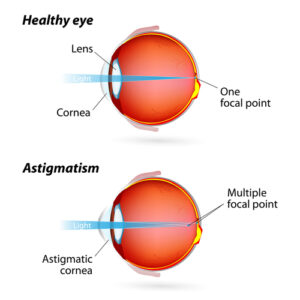Blog post by: Eye Physicians of Long Beach

Do you have cataracts? If you need to have your cataracts removed by having cataract surgery, you may also be happy to learn you can correct refractive errors simultaneously. While cataracts and astigmatism are unrelated eye conditions, it doesn’t mean you can’t address them during the same procedure.
The procedure is highly effective and safe when you have cataract surgery performed by an expert surgeon at Eye Physicians of Long Beach. Combining cataract surgery with astigmatism correction can give you the best vision possible. Keep reading to learn more about treating astigmatism when you have cataract surgery!
What Is Astigmatism?

In a normal eye, the cornea is round and the shape of a basketball. But when you have astigmatism, the cornea is more spherical and looks like a football. Because of astigmatism, light passing through the cornea doesn’t focus properly on the retina. The result is blurry, distorted vision at any distance that causes headaches and discomfort.
You can correct astigmatism by using glasses or contact lenses. The higher your astigmatism, the blurrier your vision will be without contacts or eyeglasses. Like other refractive errors, astigmatism doesn’t go away on its own. Luckily, you can correct it when removing your cataracts during cataract surgery.
What Is A Cataract?

A cataract occurs when proteins start to clump together on the natural lens of your eye, causing it to become cloudy. As cataracts develop, they cause visual impairment, making it more challenging to see. Cataracts most often develop due to aging and are something that almost everyone will end up with eventually. If you leave them untreated, they will result in vision loss and even blindness.
The good news is that you can restore your ability to see clearly by having cataract surgery. Cataract surgery is the only way to treat cataracts. A crucial component of having cataract surgery is choosing an intraocular lens (IOL). The IOL is necessary because it replaces the natural lens after its removal. You must have a lens if you want to see clearly. There are many kinds of IOLs available, but if you have astigmatism, there’s one, in particular, that’s best. For patients with astigmatism, toric IOLs are the only IOL specifically designed to treat astigmatism.
Toric Lenses
Toric IOLs are advanced premium lenses that allow you to enjoy crisp, clear vision with increased independence from contacts or glasses. Beyond correcting astigmatism, toric lenses also improve distance vision. With astigmatism, various parts of your eye need different prescriptions to focus light properly. For this reason, toric IOLs have separate prescriptions in the various parts of the lens.
Due to how a toric lens works, your surgeon must place the IOL accurately in your eye to deliver the best outcome. Once implanted, you’ll see considerable visual improvement. Because they are premium lenses, you’ll have to pay out of pocket for toric lenses. Medical insurance won’t usually pay for them, but if you have astigmatism and need to have your cataracts removed, it’s a cost that’s well worth it for many patients.
Cataract Surgery and Astigmatism Correction
During the procedure, your surgeon makes a tiny incision in your cornea. They can access the natural lens where the cataract is through this opening. After accessing the lens, the surgeon breaks up the cataract into small pieces and extracts them. Once they’ve removed all pieces using phacoemulsification, they can implant your new toric lens.

Toric lenses pose no additional risks to cataract surgery and only lengthen the procedure by a few minutes. It’s important to note that a toric intraocular lens might not correct all of your astigmatism, especially if it’s severe. You may find you need weaker reading glasses to correct any residual astigmatism.
After cataract surgery, toric lenses not only fix astigmatism but also:
- Improve nighttime driving
- Increase sensitivity to contrast, resulting in enhanced image quality
- Offer protection against damaging blue light, UV rays, and light from fluorescent bulbs
What kind of vision correction your toric lenses lend you depends on the premium lens you choose.
Reasons to Correct Astigmatism During Cataract Surgery
Your surgeon may recommend addressing astigmatism at the time of cataract surgery due to the following reasons:
Astigmatism Worsens After Cataract Surgery
Astigmatism in about 70 percent of corneas is 0.75 diopters, enough to impact your vision considerably. Undergoing cataract surgery alone tends to worsen astigmatism in most people. Going into cataract surgery with astigmatism that you don’t correct may result in vision that isn’t as sharp as you want. You may still need prescription glasses to see clearly because of uncorrected and higher levels of astigmatism than before the procedure.

Poor Quality of Life
Blurred or distorted vision because of astigmatism can negatively impact all areas of your life. Astigmatism causes constant headaches, poor vision, and eye strain. These symptoms can affect your ability to work, perform routine activities, and live your best life. Blurry, fuzzy vision will become a thing of the past after astigmatism correction.
Increased Risk of Falls and Injuries
Astigmatism affects depth perception, increasing the chances of falling. Any increased risk of falling is hazardous for seniors as injuries can lead to serious health consequences. Fall-related injuries such as a broken hip or fractured bones require surgery. Unfortunately, older adults are more likely to experience complications from surgeries.
Additional trauma to the body can affect recovery, which may have a debilitating effect on your everyday life. Astigmatism correction during cataract surgery increases depth perception. Depth perception helps you judge the distance between objects and hazards, helping reduce the risk of falling and injuring yourself.
Restore Your Vision with Custom Cataract Surgery and Toric IOLs

If it’s time for cataract surgery and you have astigmatism, the excellent cataract surgeons at Eye Physicians of Long Beach can fix both in a single procedure. Our state-of-the-art team will tailor a treatment plan to suit your unique vision needs. Is poor vision affecting your quality of life? Schedule a cataract consultation at Eye Physicians of Long Beach in Long Beach, CA, and regain your ability to see clearly!
